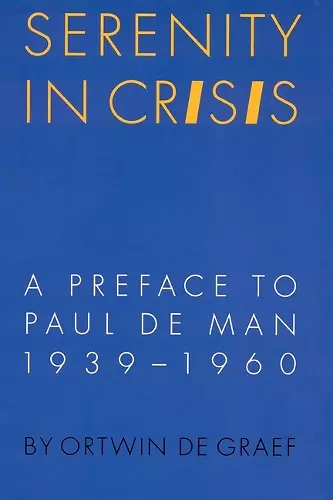Serenity in Crisis
A Preface to Paul de Man, 1939-1960
Format:Hardback
Publisher:University of Nebraska Press
Published:1st Jan '93
Currently unavailable, and unfortunately no date known when it will be back

This book offers a deep exploration of Paul de Man's life, work, and the controversies that define his legacy, particularly during the Nazi occupation.
In Serenity in Crisis, readers are introduced to a nuanced examination of Paul de Man's complex legacy. The book delves into the life and work of de Man, a pivotal figure in literary criticism and a founder of deconstruction. It explores how his contributions to the field were intertwined with his controversial political choices during the Nazi occupation, revealing the intricate relationship between his philosophical ideas and historical context. Ortwin de Graef meticulously reconstructs the ideational frameworks that influenced de Man's decisions, shedding light on the competing truths that shaped his understanding of literature and politics.
The narrative also addresses the impact of de Man's work on the Yale Critics and the broader literary community. De Graef's analysis goes beyond mere biography; it critiques the logical pathways in de Man's early writings and their implications for contemporary thought. By examining the intersections of natural sciences, social sciences, and literature, Serenity in Crisis provides a comprehensive view of de Man's intellectual journey and the persistent concerns that marked his early work.
Ultimately, this book serves as a critical reassessment of de Man's legacy, inviting readers to engage with the complexities of his thought and the historical circumstances that shaped it. De Graef's insights challenge prevailing interpretations and encourage a deeper understanding of the philosophical debates that continue to resonate in today's literary discourse.
"This is an outstanding work of scholarship and criticism. It is the most scrupulous and intelligent study of Paul de Man's writings."—Jonathan Culler, author of On Deconstruction (1982)
"Wiley was a creative thinker. He once wrote of seeing Muhammad Ali in his current condition and wondering what Ali’s fists had done to the brains of other men. So when Wiley’s thoughts turn to boxing, it’s worth the read."—Thomas Hauser, Secondsout.com
"The debates about deconstruction may now be waning, but the historical and cultural analysis of the phenomenon is just beginning. De Graef's book will be the beginning of a serious study of this movement as an intellectual force."—Sander Gilman, author of Inscribing the Other (Nebraska, 1991)
ISBN: 9780803216945
Dimensions: unknown
Weight: 539g
242 pages